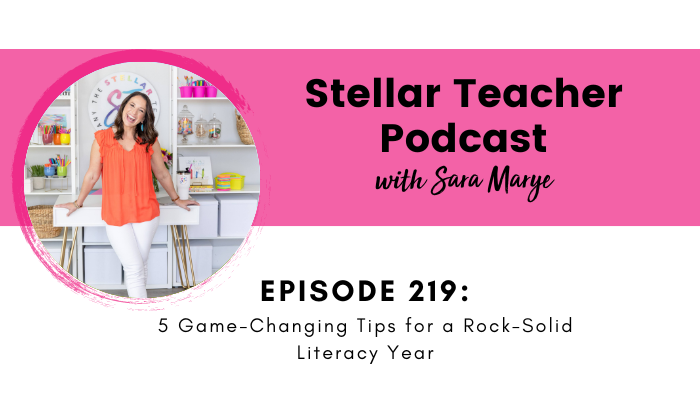
Click play below to listen to 5 key strategies for planning a successful year teaching literacy.
In today’s episode, we’re diving into five key strategies to help you build a more effective literacy block in your classroom. As teachers, it can be tempting to compartmentalize every aspect of literacy instruction into separate chunks, but that often leads to time constraints and missed opportunities for students to apply their skills holistically. We’ll explore why it’s crucial to avoid teaching everything in isolation and how we, at the Stellar Literacy Collective, have designed resources to make it easier for you to integrate different literacy components seamlessly into your schedule.
Flexibility is key when planning your literacy block. While routines and schedules provide structure, being adaptable to your students’ needs is just as important. Today, we’ll discuss how to balance the consistency of your literacy routines with the flexibility to adjust your pacing based on student responses. Remember, the goal isn’t to rigidly follow the schedule but to focus on the content and let your students’ progress guide your instruction.
We’ll also talk about setting realistic expectations for what you can accomplish in your literacy block. By auditing your time and building in buffer moments, you’ll become better at predicting how long activities will actually take. Along the way, we’ll touch on why focusing on mastery over mere completion leads to meaningful progress, and why the traditional five-day school week shouldn’t be the sole dictator of your schedule. So don’t be afraid to introduce new lessons or assessments on any day of the week!
In this episode on planning a successful year of teaching literacy, I share:
- Why teaching everything in isolation can be a trap.
- How flexibility in your routine can lead to better student outcomes.
- Why doing a time audit can help you set realistic expectations for your teaching.
- That student mastery of the standards should be your focus.
- Why the traditional five-day school week shouldn’t dictate your literacy schedule.
Resources:
- Join The Stellar Literacy Collective
- Sign up for my Private Podcast: Confident Writer Systems Series
- Sign up for my FREE Revision Made Easy email series
- If you’re enjoying this podcast, please leave a review on Apple Podcasts!
Related Episodes:
- Episode 150, 3 Mistakes That Teachers Make When Creating a Literacy Block Schedule
- Episode 101, A Literacy Routine for Building Students’ Sentence Structure Skills
- Episode 59, Simplifying the Struggle of Fitting Everything Into Your Literacy Block
Connect with me:
- Join my newsletter
- Shop my TPT store here
- Instagram: @thestellarteachercompany
- Facebook: The Stellar Teacher Company
More About Stellar Teacher Podcast:
Welcome to the Stellar Teacher Podcast! We believe teaching literacy is a skill. It takes a lot of time, practice, and effort to be good at it. This podcast will show you how to level up your literacy instruction and make a massive impact on your students, all while having a little fun!
Your host, Sara Marye, is a literacy specialist passionate about helping elementary teachers around the world pass on their love of reading to their students. She has over a decade of experience working as a classroom teacher and school administrator. Sara has made it her mission to create high-quality, no-fluff resources and lesson ideas that are both meaningful and engaging for young readers.
Each week, Sara and her guests will share their knowledge, tips, and tricks so that you can feel confident in your ability to transform your students into life-long readers.
Tune in on your favorite podcast platform: Apple, Google, Amazon, Spotify, Castbox, and more! If you’re loving this podcast, please rate, review, and follow!
Podcast (stellar-teacher-podcast): Play in new window | Download
You’re listening to episode number 219, of the Stellar Teacher Podcast.
Teaching literacy is tough, but with the right tools, you can be not only good, but great, amazing. I’m talking off the charts, impactful. Hey, I’m Sarah Marye, a literacy specialist with over a decade of experience working as a classroom teacher and school administrator. Tune in each week to this podcast to hear no fluff lesson ideas and strategies that will help you feel confident in your abilities to truly grow your students as readers. Are you ready? Let’s dig in.
Hey there. Happy Monday! I am so glad you are tuning in today, and I hope that you are having a great start to your week. I know many of you are a few weeks into the school year, and we always have so much excitement and energy as we kick off the year. While we want that excitement and energy to carry us through the entire year, I think, its’ unrealistic to expect that we will constantly have the back to school high all year long.
It’s possible that you are entering that season where you start to just feel bogged down by everything that you have to get done. So often, teachers ask questions about, How do I fit everything into my literacy block? How do I make sure that I am covering all of the standards that I have to teach? I have so many different levels of students that I have to support.
And maybe you’re starting to feel the overwhelm and the pressure of the year. If that is where you’re at, let me just remind you to take a step back. Take a deep breath. And I love reminding teachers – you have the entire year. And so even if it feels like you have a lot to teach, you have until May or June, and that is a long time away. So take a deep breath. Don’t allow that to stress you out.
But I do want to talk about some ways that we can approach our scheduling and how we can really think about our literacy block to set ourselves up for success this year. One thing that I feel very strongly about is that when a teacher feels the most confident, they are going to be able to provide the most effective instruction possible. One of the goals of this podcast is to help inspire you to feel confident and to be empowered to make decisions in your classroom.
And now that you are really into the routine of the year. I know oftentimes at the start of the year we have abnormal schedules. We’re still introducing routines to our students. We’re doing all of those beginning of the year assessments, and usually towards the end of September is when we settle into our groove. And this can be a really great thing, and it can also come with some challenges.
And so what I want to do today is share five keys to a successful year of teaching literacy. Five things that I think if you keep these things in mind, and they really have to do with planning and scheduling, which are things that teachers often ask about. But if you keep these five things in mind, even if you just keep two or three of these things in mind and actually put them into practice, you are going to have just a stellar year.
So we are going to go ahead and jump right in. So if you want to be really effective with your literacy block this year, the first thing that I would encourage you to do is don’t try to teach or practice everything in isolation. And I know that this is hard, but it really is important, and I really think it is essential if we want to have a highly effective literacy block.
And I think we’re tempted to take our literacy block, whether you have 60 minutes, 90 minutes or 120 minutes, and we want to break it up into these small chunks of time. So we’re going to have 15 minutes for grammar, we’re going to have 20 minutes that’s just for our reading standards. We’re going to have 20 minutes for writing. We’re going to have 10 minutes for vocabulary, 15 minutes for spelling. And when we do that, we break our literacy block into these small little chunks for content areas. It might feel easy to plan and to find materials that focus on those isolated skills, but when we do that, there’s really two big challenges or problems that come up with trying to teach everything in isolation.
And the first is you are guaranteed to run out of time. If every day you are trying to teach each aspect of your literacy block as an individual time chunk, you will not have enough time. And when we don’t have enough time for things, that’s when we get stressed out, because we feel like we get behind. So I would not recommend that.
The second thing is that when we try to teach everything in isolation, we are basically teaching our students to apply literacy skills in isolation. And I think the problem with that is is, if you think about it, when we are reading and when we’re writing, we are doing a combination of a lot of literacy skills, right? It’s like when we’re reading, we’re not just looking for vocabulary or just thinking about context clues. When we’re reading, we are using context clues, we’re paying attention to word choice, we’re asking questions, we’re monitoring our comprehension, we’re summarizing, we might be writing about reading, we might be looking for text evidence. We’re doing a bunch of things at once, but we often want to teach things as if they are isolated, separated skills. And so what we really want to do is we really want to think about, how can we embed a variety of literacy skills into a single reading experience or a single writing experience?
Now, don’t get me wrong, we definitely want to make sure that we are explicitly teaching things to our students. WeWe want to explicitly teach vocabulary, we want to explicitly teach revision skills, but we don’t have to have a separate time block for all of our explicit instruction. And not wanting to have teachers to teach everything in isolation was really a huge motivator behind why we decided to do a huge update and create our brand new whole group lessons for the Stellar Literacy Collective. For a variety of reeasons.. One, I think it can be difficult for a teacher to really think about, what are all of the opportunities that I have within this reading or writing experience to teach multiple literacy skills. And so we really wanted to do the heavy lifting and make it easy for teachers to identify all of those opportunities, and then, of course, give them the resources to do so. So for example, within one of our reading lessons, teachers will have a reading passage, and that reading passage, of course, is going to give students an opportunity to practice different comprehension skills. So maybe they are going to be summarizing at the end of reading, or maybe they’re going to be identifying the elements of plot as they’re reading. But that’s not the only thing that students need to focus on or can focus on while they’re reading. We can also use this same reading experience to explicitly teach a new vocabulary word or two, and so it’s within the same passage, and we’re just going to pull out some vocabulary words and then go through the process of what it looks like to explicitly teach vocabulary to our students. We could also pull out a sentence from the text and use it to teach some element of syntax, whether it’s identifying a specific type of sentence or a type of phrase, but we can explicitly teach that syntactic element through the context of this reading passage. And so I think it’s really important to remember that we can explicitly teach different literacy skills within the same read aloud or throughout a single writing assignment. That not everything has to be broken up and taught as an individual lesson, that we can really combine things, like I said, into these bigger reading or writing experiences. So the first sort of recommendation is try not to teach or practice everything in isolation, because you’re going to run out of time and it’s just going to stress you out.
So the second thing that I would encourage you to do this next year when you think about your literacy instruction is to approach your literacy block with flexibility. And really what we want to do is we don’t want to force our literacy block to be so rigid. Now, yes, we want to have a schedule, and yes, we want to have routines, and we want there to be some consistency, but we want there to be flexibility.
Now, if you have listened to the podcast for a while, or if you’re a part of the Stellar Literacy Collective, you know that we love routines. We are a huge fan of helping you implement routines in your classroom. But really, what we do is we want these routines to help your instruction, not necessarily hinder them. And so we don’t want our literacy block to be so rigid that we feel like we can’t, on occasion, either break or disrupt a routine. So the goal is not the routine, the goal is the content that students are engaging with in the routine.
So just some examples to think about in terms of having flexibility. You might start a read aloud, and you might realize that your students need a lot more background knowledge in order for them to understand it. Maybe you’re doing a read aloud about a specific ecosystem or the food chain, and you realize that your students don’t have much understanding of this at all. So you’re going to pause and pivot, and before you continue reading, you’re going to build some background knowledge. You’re going to show them some images, maybe show them a video, maybe introduce some more vocabulary words, and really help them develop the knowledge necessary so that way they can fully comprehend the text. But that means that your read aloud time is going to be a little bit longer than you originally budgeted, which means maybe you don’t have time to pull small groups that day. That’s okay. We’re going to be flexible.
Maybe you start a writing assignment and you realize that your students need more time to revise their writing, so you decided to extend the length of time that you are planning to focus on that specific writing assignment so you can teach some additional revision strategies and let your students apply them. But this means that you are going to delay the end of this project, which will push back the start of your next writing assignment, which might throw off your entirentire writing scope and sequence. But that’s okay.
I think it’s really important to remember that the goal of our instruction, (wee want our assignments and our pacing to be flexible based off of our students and the response that they give us to our instruction), the goal is to let your students really guide your literacy block and their response to your instruction, not the exact time blocks on your schedule. So you can estimate in your head, it’s like, okay, I think we need 20 minutes for a read aloud, or I think we need four days for this writing project. But it’s just an estimation, and it’s a starting point recognizing that there will be some days that you need more time and that there are going to be some weeks that you need more time for whatever it is that you budgeted for. So approach your literacy block with flexibility. It is totally okay if you have to go off schedule or off your scope and sequence for the sake of your students.
Which leads me into the third recommendation, and that is to really be realistic about what you have time to teach. Now, if I am being honest, this is something that I still struggle with as an adult. Now I’m not in the classroom anymore, but I still have a work schedule every week, and I have things I need to do, like write emails and record podcasts and put together trainings and meet with my team, and when I’m putting my schedule together for the week, I consistently think that I have more time in a week that I actually have, and I also consistently underestimate how long tasks are going to take me.
And so one of the things that I have learned is that I have to naturally put in some buffer time so that way I don’t overextend myself and end up at the end of the week with tasks that didn’t get done or working long into the night or the weekends. And the same is true when we’re in the classroom, right? And this happened to me when I was a teacher. I was very unrealistic about how long I thought things would take, and so I think it’s important for us to be really clear with how long it takes for our students to complete specific activities. So for example, if on your schedule, on paper, you are dedicating 10 minutes to your daily sentence writing routine, and you’re like, okay, it fits into my schedule. It’s only going to take 10 minutes. But if, in reality, it actually takes your students 20 minutes every day to do their sentence writing routine, then you have to recognize that the 10 minute gap that you are creating is ultimately going to be a source of frustration for you, because that means something that you budgeted just 10 minutes for is taking twice as long. Andnd it’s taking 10 minutes away from something else, and you’re going to consistently run out of time day after day, because you’re not allocating enough time for this daily task.. You’re unaware of how long it’s actually taking your students. And so on paper, you don’t have enough time dedicated to it.
And so one of the things that I think is really powerful for teachers to do, and this is a really great thing to do at the start of the year, because it gives you a lot of information. If you have no idea how long things are taking you, and if you look at your schedule and you’re like, okay, everything fits in my schedule on paper, but in reality, we can’t get through half of the things that I planned, then I would encourage you to do a time audit. And a time audit is simply you getting really curious about how long things take you and timing yourself and then writing those times down. You could even have a student do it. You can also make this a group thing. Tell your class that, hey, we want to be as effective as possible this year, so we’re going to time ourselves. We’re going to see how long things take us, and then that’s going to help us know how we can plan for a really successful literacy block. Just tell a student I want you to start and stop the timer every time we switch subjects. And so figure out, how long is your sentence writing routine taking you. How long is your reading lesson taking you? How long is your writing lesson taking you? How long do you spend with small groups? Not how long do you think you spend, but how long do you actually spend? Because when you have that information, then you can say, Okay, I thought this was only going to take a certain amount of time, but in reality, this is the time that we spend. But also, the more realistic you get about how long things will take you, the easier it’s going to be for you to predict and anticipate future tasks or activities that you’re preparing for later on in the year.
So be realistic about what you have time to teach. I know it sounds really good, if you’re like, Okay, we can get through all of this in a day or a week, but if you put it on paper and you don’t get it done, then you feel guilty because you didn’t get everything done. You feel behind because there were three lessons that you didn’t get through during the week. You feel really frustrated because your schedule took longer than you thought it would. And so planning more than you have time to teach only creates these negative feelings.
Think about it from the other side, right? What if you’re really realistic about what you plan, and at the end of the day, or at the end of the week, you’re like, wow, I got through everything that was on my plan. Or, you know what, we actually had 10 extra minutes at the end of the day. The sort of opposite happens is that when you get through everything that you plan, or you have extra time, you have a sense of accomplishment, you feel really productive. You realize that it’s like, okay, we have extra time. I can put some additional things in there. And I know teachers, it’s like, if you have extra time, you will have no problem filling it. You know, it’s not like you have to worry about, okay, well, what happens if we have extra time at the end of the day? What are we going to focus on? Do a read aloud. Have your students practice writing, bring in another one of the routines. There’s so many things that you could do, revisit what you were working on the previous day, revise their writing. There’s so many things that you can do if you have extra time. So don’t feel like you have to over plan. If anything, I would encourage you to under plan and then think creatively about how can you use any extra time that you have?
So the fourth thing I want you to keep in mind is that as you are teaching this year during your literacy block, really make your focus be on mastery versus completion. And I know I’ve talked about this before in different workshops and trainings that I’ve hosted, but we really want to move away from viewing our instruction like a checklist. The goal of our weekly lesson plans is to actually teach them with the result of increasing our students understanding and our students mastery. The goal is not to teach them just so we can check off some boxes. And I think this is a hard thing for teachers to really embrace, because in order for us to make our focus on mastery versus completion, it really requires us to be committed to slowing down our instruction and really paying attention to how our students are mastering the content.
But I want you to think about it like this, if you rush through a lesson just because you feel like you need to get through it in a day, because you don’t have extra time, and you have to stay on top of your pacing guide, and so we only have 20 minutes we have to get through this lesson. But if at the end of the lesson, or at the end of the week, your students haven’t acquired any new knowledge, or they haven’t made progress towards mastery, then you’re really just wasting your instructional time. So even if you get all of your lessons done, if the result of your lessons doesn’t lead to an increase in student knowledge or an increase in students making progress towards mastery, then what was the point of teaching the lesson in the first place? And so I love to remind teachers, I know this is hard, but it is going to be a much better use of your instructional time if you take the time you need and really help your students make progress towards mastery, even if that means you have to slow down your instruction. Maybeaybe you have to spend two days on something, or maybe you have to scrap a lesson and reteach something. You have to really pay attention. Are your students making progress as a result of your lessons? And if they aren’t, then you either need to change up the way that you’re teaching or really slow down. And that I know is challenging, but definitely try to make that your focus this year, if possible.
And then this last one is very practical and also really, really hard for teachers. I know we talked about this a couple weeks ago in a training I did inside the Stellar Literacy Collective. And so many teachers were like, Oh, you’re so right, but this is so so so hard. So my sort of fifth and final reminder to really putting together a stellar literacy block this year is don’t let our five day school week be the thing that dictates your schedule. It is really beneficial when we can step away from that. And I know we often fall into this trap, and in full disclosure, I fell into this trap as well. But the way our system sort of pushes us to think, is this idea that we introduce a skill or a concept or a new lesson or a new unit on a Monday, then we’re going to practice on Tuesday, Wednesday, Thursday, and then we’re going to assess on Friday. On paper that looks so nice and neat and it seems so perfect, and it’s consistent, and we have a great schedule, and it’s so easy to plan for. But really, this approach to our instructional week, I think is problematic for a few reasons.
One, it ultimately turns our Friday into a test heavy day for our students. Even if you’re departmentalized and you’re like, Well, this is how I do it in reading. If this is also how your co-teacher operates their math block, and if this is how science and social studies is operated, ultimately what happens is, on Fridays, students have multiple tests or quizzes in a single day, which just becomes, I think, developmentally inappropriate.
But the other thing that I think is a problem with this sort of schedule is that not every skill or concept we teach our students requires the same amount of practice. Or needs the same level of assessment, or even needs to be assessed in the same way. And so if we’re trying to put everything we teach into this Monday through Friday schedule, we are not going to be effectively teaching. We’re not going to be teaching necessarily in the most effective way. And so we really want to think about, when does it make the most sense to introduce something and how much time do my students need to spend on it? Don’t be afraid to introduce a new lesson on a Wednesday. Don’t be afraid to give an assessment on a Tuesday. And again, rather than really thinking about the calendar schedule being the thing that dictates your plan, we’rereally paying attention to the content that we’re teaching and how our students are responding to it. So don’t let that five day school week really be the thing that dictates your schedule.
Okay, let me quickly recap five things that I want you to keep in mind this year, that if you commit to doing these things, it is going to really set you up to have a successful year of teaching literacy. The first one is, don’t try to teach or practice everything in isolation. The second one is to approach your literacy block with flexibility. The third is to be really realistic about what you have time to teach. The fourth is to make sure that you are focusing on mastery versus just completion. And then the last one is, don’t let the five day school week be the thing that dictates your schedule.
And of course, if you are looking for more support this year with resources, professional development and community, we would love to have you join us inside the Stellar Literacy Collective, which is our membership site for third, fourth and fifth grade teachers. If you want to learn more, you can head to stellarteacher.com/join to get some information.
I hope you have a great week, and I will see you back here next Monday.
Thanks so much for joining me today. If you enjoyed today’s episode and are finding value in this podcast. It would mean the world to me if you subscribe and leave a five star positive review. This helps me spread the word to more and more teachers, just like you. Don’t forget to join me over on Instagram @thestellarteachercompany, and you can also find links and resources from this episode in the show notes at stellarteacher.com. I’ll see you back here next week.

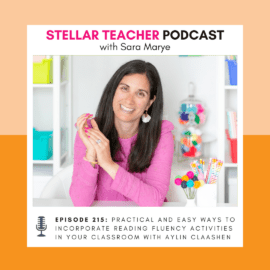
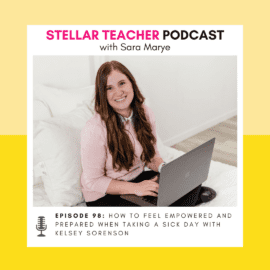

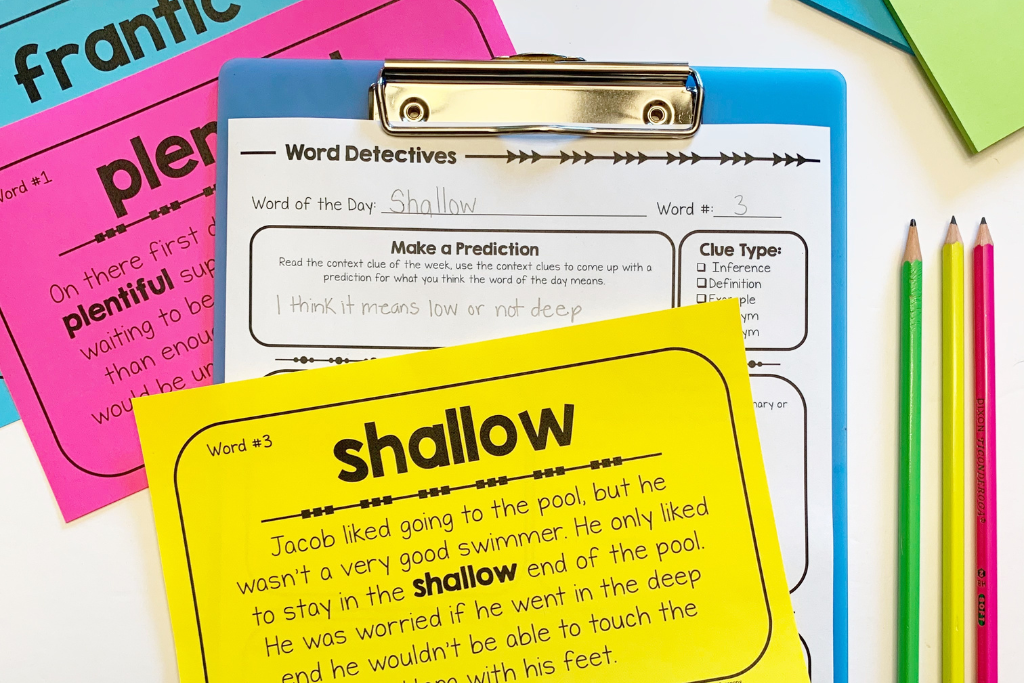

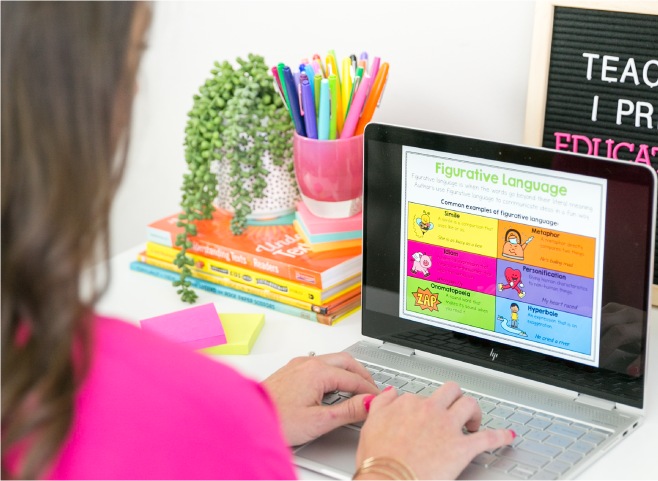
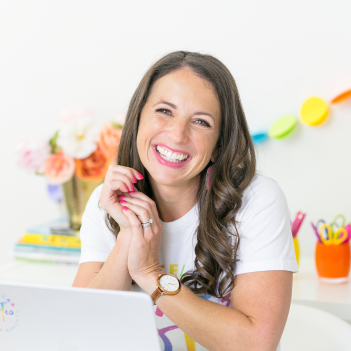
Leave a Comment
You must be logged in to post a comment.